- Home
- Sidney Sheldon
A Stranger in the Mirror Page 3
A Stranger in the Mirror Read online
Page 3
Chapter 2
In 1939, New York City was a mecca for the theater. The Depression was over. President Franklin Roosevelt had promised that there was nothing to fear but fear itself, that America would be the most prosperous nation on earth, and so it was. Everyone had money to spend. There were thirty shows playing on Broadway, and all of them seemed to be hits.
Toby arrived in New York with a hundred dollars his mother had given him. Toby knew he was going to be rich and famous. He would send for his mother and they would live in a beautiful penthouse and she would come to the theater every night to watch the audience applaud him. In the meantime, he had to find a job. He went to the stage doors of all the Broadway theaters and told them about the amateur contests he had won and how talented he was. They threw him out. During the weeks that Toby hunted for a job, he sneaked into theaters and nightclubs and watched the top performers work, particularly the comedians. He saw Ben Blue and Joe E. Lewis and Frank Fay. Toby knew that one day he would be better than all of them.
His money running out, he took a job as a dishwasher. He telephoned his mother every Sunday morning, when the rates were cheaper. She told Toby about the furor caused by his running away.
"You should see them," his mother said. "The policeman comes over here in his squad car every night. The way he carries on, you would think we were all gangsters. He keeps asking where you are. "
"What do you tell him?" Toby asked anxiously.
"The truth. That you slunk away like a thief in the night, and that if I ever got my hands on you I would personally wring your neck. "
Toby laughed aloud.
During the summer, Toby managed to get a job as an assistant to a magician, a beady-eyed, untalented mountebank who performed under the name of the Great Merlin. They played a series of second-rate hotels in the Catskills, and Toby's primary job was to haul the heavy paraphernalia in and out of Merlin's station wagon, and to guard the props, which consisted of six white rabbits, three canaries and two hamsters. Because of Merlin's fears that the props would "get eaten," Toby was forced to live with them in rooms the size of broom closets, and it seemed to Toby that the whole summer consisted of one overpowering stench. He was in a state of physical exhaustion from carrying the heavy cabinets with trick sides and bottoms and running after props that were constantly escaping. He was lonely and disappointed. He sat staring at the dingy, little rooms, wondering what he was doing here and how this was going to get him started in show business. He practiced his imitations in front of the mirror, and his audience consisted of Merlin's smelly little animals.
One Sunday as the summer was drawing to a close, Toby made his weekly telephone call home. This time it was his father who answered.
"It's Toby, Pop. How are you?"
There was a silence.
"Hello! Are you there?"
"I'm here, Toby. " Something in his father's voice chilled Toby.
"Where's Mom?"
"They took her to the hospital last night. "
Toby clutched the receiver so hard that it almost broke in his fist. "What happened to her?"
"The doctor said it was a heart attack. "
No! Not his mother! "She's going to be all right," Toby demanded. "Isn't she?" He was screaming into the mouthpiece. "Tell me she's going to be all right, goddam you!"
From a million miles away he could hear his father crying. "She - she died a few hours ago. "
The words washed over Toby like white-hot lava, burning him, scalding him, until his body felt as though it were on fire. His father was lying. She couldn't be dead. They had a pact. Toby was going to be famous and his mother was going to be at his side. There was a beautiful penthouse waiting for her, and a limousine and chauffeur and furs and diamonds. . . . He was sobbing so hard he could not breathe. He heard the distant voice saying, "Toby! Toby!"
"I'm on my way home. When is the funeral?"
"Tomorrow," his father said. "But you mustn't come here. They'll be expecting you, Toby. Eileen is going to have her baby soon. Her father wants to kill you. They'll be looking for you at the funeral. "
So he could not even say goodbye to the only person in the world he loved. Toby lay in his bed all that day, remembering. The images of his mother were so vivid and alive. She was in the kitchen, cooking, telling him what an important man he was going to be, and at the theater, sitting in the front row and calling out, "Mein Himmel! What a talented boy!"
And laughing at his imitations and jokes. And packing his suitcase. When you're a famous star, you'll send for me. He lay there, numbed with grief, thinking, I'll never forget this day. Not as long as I live. August the fourteenth, 1939. This is the most important day of my life.
He was right. Not because of the death of his mother but because of an event that was taking place in Odessa, Texas, fifteen hundred miles away.
The hospital was an anonymous four-story building, the color of charity. Inside was a rabbit warren of cubicles designed to diagnose sickness, alleviate it, cure it or sometimes bury it. It was a medical supermarket, and there was something there for everyone.
It was four A. M. , the hour of quiet death or fitful sleep. A time for the hospital staff to have a respite before girding for the battles of another day.
The obstetrical team in Operating Room 4 was in trouble. What had started out as a routine delivery had suddenly turned into an emergency. Up until the actual delivery of the baby of Mrs. Karl Czinski, everything had been normal. Mrs. Czinski was a healthy woman in her prime, with wide peasant hips that were an obstetrician's dream. Accelerated contractions had begun, and things were moving along according to schedule.
"Breech delivery," Dr. Wilson, the obstetrician, announced. The words caused no alarm. Although only three percent of births are breech deliveries - the lower part of the infant emerging first - they are usually handled with ease. There are three types of breech deliveries: spontaneous, where no help is required; assisted, where the obstetrician lends nature a hand; and a complete "breakup," where the baby is wedged in the mother's womb.
Dr. Wilson noted with satisfaction that this was going to be a spontaneous delivery, the simplest kind. He watched the baby's feet emerge, followed by two small legs. There was another contraction from the mother, and the baby's thighs appeared.
"We're almost there," Dr. Wilson said encouragingly. "Bear down once more. "
Mrs. Czinski did. Nothing happened.
He frowned. "Try again. Harder. "
Nothing.
Dr. Wilson placed his hands on the baby's legs and tugged, very gently. There was no movement. He squeezed his hand past the baby, through the narrow passage into the uterus, and began to explore. Beads of perspiration appeared on his forehead. The maternity nurse moved close to him and mopped his brow.
"We've got a problem," Dr. Wilson said, in a low voice.
Mrs. Czinski heard. "What's wrong?" she asked.
"Everything's fine. " Dr. Wilson reached in farther, gently trying to push the infant downward. It would not budge. He could feel the umbilical cord compressed between the baby's body and the maternal pelvis, cutting off the baby's air supply.
"Fetoscope!"
The maternity nurse reached for the instrument and applied it to the mother's belly, listening for the baby's heartbeat. "It's down to thirty," she reported. "And there's marked arrhythmia. "
Dr. Wilson's fingers were inside the mother's body, like remote antennae of his brain, probing, searching.
"I'm losing the fetal heartbeat - " There was alarm in the maternity nurse's voice. "It's negative!"
They had a dying baby inside the womb. There was still a slim chance that the baby could be revived if they could get it out in time. They had a maximum of four minutes to deliver it, clear its lungs and get its tiny heart beating again. After four minutes, brain damage would be massive and irreversible.
"Clock it," Dr. Wilson ordered.
Everyone in the room instinctive
ly glanced up as the electric clock on the wall clicked to the twelve o'clock position, and the large red second hand began making its first sweep.
The delivery team went to work. An emergency respiratory tank was wheeled to the table while Dr. Wilson tried to dislodge the infant from the pelvic floor. He began the Bracht maneuver, trying to shift the infant around, twisting its shoulders so that it could clear the vaginal opening. It was useless.
A student nurse, participating in her first delivery, felt suddenly ill. She hurried out of the room.
Outside the door of the operating room stood Karl Czinski, nervously kneading his hat in his large, calloused hands. This was the happiest day of his life. He was a carpenter, a simple man who believed in early marriage and large families. This child would be their first, and it was all he could do to contain his excitement. He loved his wife very much, and he knew that without her he would be lost. He was thinking about his wife as the student nurse came rushing out of the delivery room, and he called to her, "How is she?"
The distraught young nurse, her mind preoccupied with the baby, cried, "She's dead, she's dead!" and hurried away to be sick.
Mr. Czinski's face went white. He clutched his chest and began gasping for air. By the time they got him to the emergency ward, he was beyond help.
Inside the delivery room, Dr. Wilson was working frantically, racing the clock. He could reach inside and touch the umbilical cord and feel the pressure against it, but there was no way to release it. Every impulse in him screamed for him to pull the half-delivered baby out by force, but he had seen what happened to babies that had been delivered that way. Mrs. Czinski was moaning now, half delirious.
"Bear down, Mrs. Czinski. Harder! Come on!"
It was no use, Dr. Wilson glanced up at the clock. Two precious minutes were gone, without any blood circulating through the baby's brain. Dr. Wilson faced another problem: what was he going to do if the baby were saved after the four minutes had elapsed? Let it live and become a vegetable? Or let it have a merciful, quick death? He put the thought out of his mind and began to move faster. Closing his eyes, working by touch, all his concentration focused on what was happening inside the woman's body. He tried the Mauriceau-Smellie-Veit maneuver, a complicated series of moves designed to loosen and free the baby's body. And suddenly there was a shift. He felt it begin to move. "Piper forceps!"
The maternity nurse swifty handed him the special forceps and Dr. Wilson reached in and placed them around the baby's head. A moment later the head emerged.
The baby was delivered.
This was always the instant of glory, the miracle of a newly created life, red-faced and bawling, complaining of the indignity of being forced out of that quiet, dark womb into the light and the cold.
But not this baby. This baby was blue-white and still. It was a female.
The clock. A minute and a half left. Every move was swiftly mechanical now, the result of long years of practice. Gauzed fingers cleared the back of the infant's pharynx so air could get into the laryngeal opening. Dr. Wilson placed the baby flat on its back. The maternity nurse handed him a small-size laryngoscope connecting with an electric suction apparatus. He set it in place and nodded, and the nurse clicked a switch. The rhythmic sucking sound of the machine began.
Dr. Wilson looked up at the clock.
Twenty seconds left to go. Heartbeat negative.
Fifteen. . . fourteen. . . Heartbeat negative.
The moment of decision was at hand. It might already be too late to prevent brain damage. No one could ever be really sure about these things. He had seen hospital wards filled with pathetic creatures with the bodies of adults and the minds of children, or worse.
Ten seconds. And no pulse, not even a thread to give him hope.
Five seconds. He made his decision then, and hoped that God would understand and forgive him. He was going to pull the plug, say that the baby could not be saved. No one would question his action. He felt the baby's skin once more. It was cold and clammy.
Three seconds.
He looked down at the infant and he wanted to weep. It was such a pity. She was a pretty baby. She would have grown up to be a beautiful woman. He wondered what her life would have been like. Would she have gotten married and had children? Or perhaps become an artist or a teacher or a business executive? Would she have been rich or poor? Happy or unhappy?
One second. Negative heartbeat.
Zero.
He reached his hand toward the switch, and at that instant the baby's heart began to beat. It was a tentative, irregular spasm, and then another and then it steadied down to a strong, regular beat. There was a spontaneous cheer in the room and cries of congratulation. Dr. Wilson was not listening.
He was staring up at the clock on the wall.
Her mother named her Josephine, after her grandmother in Krakow. A middle name would have been pretentious for the daughter of a Polish seamstress in Odessa, Texas.
For reasons that Mrs. Czinski did not understand, Dr. Wilson insisted that Josephine be brought back to the hospital for an examination every six weeks. The conclusions each time were the same: she seemed normal.
Only time would tell.

 Windmills of the Gods
Windmills of the Gods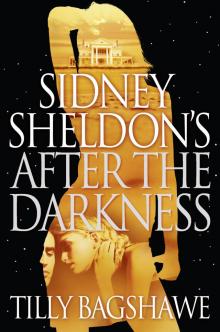 After the Darkness
After the Darkness The Best Laid Plans
The Best Laid Plans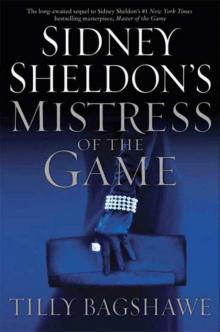 Mistress of the Game
Mistress of the Game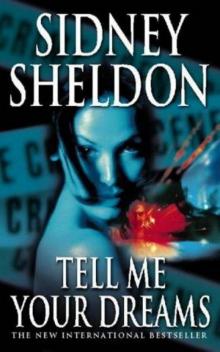 Tell Me Your Dreams
Tell Me Your Dreams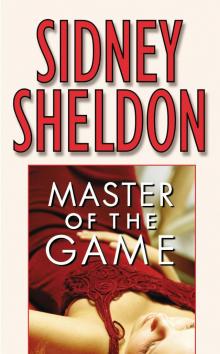 Master of the Game
Master of the Game Memories of Midnight
Memories of Midnight Are You Afraid of the Dark?
Are You Afraid of the Dark? Nothing Lasts Forever
Nothing Lasts Forever Rage of Angels
Rage of Angels The Sky Is Falling
The Sky Is Falling The Sands of Time
The Sands of Time Morning, Noon and Night
Morning, Noon and Night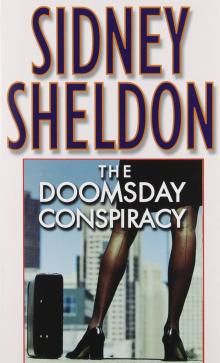 The Doomsday Conspiracy
The Doomsday Conspiracy The Naked Face
The Naked Face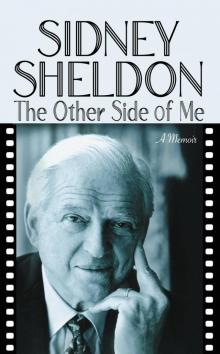 The Other Side of Me
The Other Side of Me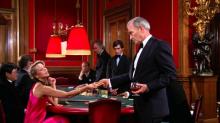 Bloodline
Bloodline The Stars Shine Down
The Stars Shine Down The Other Side of Midnight
The Other Side of Midnight A Stranger in the Mirror
A Stranger in the Mirror Sidney Sheldon's Angel of the Dark
Sidney Sheldon's Angel of the Dark Sidney Sheldon's the Tides of Memory
Sidney Sheldon's the Tides of Memory The Phoenix
The Phoenix Sidney Sheldon's Chasing Tomorrow (Tracy Whitney)
Sidney Sheldon's Chasing Tomorrow (Tracy Whitney) Sidney Sheldon's After the Darkness
Sidney Sheldon's After the Darkness Sidney Sheldon's Reckless
Sidney Sheldon's Reckless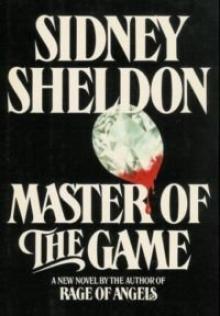 Master of the Game motg-1
Master of the Game motg-1 Sidney Sheldon's the Silent Widow
Sidney Sheldon's the Silent Widow Morning, Noon & Night
Morning, Noon & Night